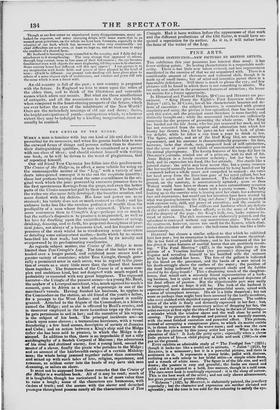THE CRUISE OF THE MIDGE.
WHEN a man is familiar with but one kind of iife and that life is proverbial for its sameness, and when his genius leads him to note the outward forms of things and persons rather than to discover their distinguishing qualities, he may be considered as a person with one class of ideas ; and should content himself with writing one book, or he will be driven to the worst of plagiarisms, that of' repeating himself.
Our old friend Tom CRINGLE has fallen into this predicament. The Cruise qf the Midge is, in effect, a mere vehicle for using up the unmanageable matter of the "Log," with a variety of inci- dents interspersed amongst it to eke out the requisite quantity; these last portions bearing about the same resemblance to the ori- ginal work which the juice procured by excessive pressure does to the first spontaneous Plowings from the grape, and even the better parts of the Cruise somewhat pall by their sameness. The faults of the writer are also more fully developed; the beauties scantier, and more dashed with his defects. His force and power are more strained ; his variety does not so much contrast as clash ; and his richness looks less like the careless profusion of wealth than the prodigality of a man whose funds are exhausted. There is not more coarseness than in Cringle's Log—perhaps not so much ; but the author's disposition to prosiness is augmented, as well as his love for dwelling upon the unintellectual matters of eating, drinking, dressing, and so forth, his perpetual descriptions of prac- tical jokes, not always of a humorous kind, and his frequent sus- pensions of the story whilst lie is wiredrawing some description or detailing some unimportant matter,—faults which by no means benefited his first work, but were redeemed by its novelty and overpowered by its predominating excellencies. As regards subject matter, the Cruise of the Midge is more limited than Tom Cringle's Log. The time of the latter was ex- tended over a longer period, and exhibited more scenes and a greater variety of countries; whilst Tom Cringle, though gene- rally a prominent actor in each scene, was in regard to the junc- tion of events as a story little more than the thread that bound them together. The framework of the Cruise is of a more com- plex and ambitious kind, but not designed with much regard to probability or executed with any great happiness. The supposed narrator—the Cringle of the present scenes—is a young Mr. Brail, the nephew of a Liverpool merchant, wbo, much against his uncle's consent, goes to Africa as a kind of supercargo in one of the merchant's vessels. Having finished his business, he applies to the Commodore on the station, an old friend of the youth's father, for a passage to the West Indies; and this request is readily granted. Attached to the frigate of the Commodore, is a felucca named the Midge ; and as she is officered by Brail's cronies, and is moreover employed in the more hazardous trips up the rivers, he gets permission to sail in her; and the narrative of his voyage is the subject of his book. The principal incidents are—an attack upon some slavers ; a tremendous hurricane, with a vessel foundering ; a few land scenes, descriptive of society at Jamaica and Cuba ; and an action between a King's ship and the Midge (after she has been sold to pirates), in which the Midge is de- stroyed. In addition to this, there is an improbable if not a silly -autobiography of a Scotch Corporal of Marines ; the adventures of his rival and destined enemy, first a young laird, second the master of a slaver, finally the pirate who perishes in the Midge; and an account of the hairbreadth escapes of a certain Midship- man; the whole being jammed together rather than connected, and mixed up with such tales of love, religion, repentance, and romance, as seldom enter into the heads of any save sick men dreaming, or sailors on shore. It must not be supposed from these remarks that the Cruise of the Midge is a worthless book. All of it may be read; much of it is laughable, though too caricatured to be of more value than to raise a laugh; some of the characters are humorous, with of truth ; and the scenes with the slaver and detached passages throughout possess nearly all the characteristics of Tom Cringle. Had it been written before the appearance of that work and the different productions of the Old Sailor, it would hare ac- quired a reputation for its author. As it is, it will rather lower the tame of the writer of the Log.






























 Previous page
Previous page